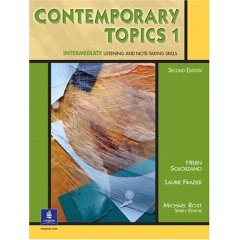|
2006 Academic Listening (Spring Semester) |
|||||||||||||||||||||||||||||||||||||||||||||||||||||||||||
|
This Week's Audio: Vocabulary X Lecture X |
|||||||||||||||||||||||||||||||||||||||||||||||||||||||||||
|
What's Your Opinion? (Survey)È |
Build Up Your Vocabulary! È |
||||||||||||||||||||||||||||||||||||||||||||||||||||||||||
 Students!
What did you think of the listening passages, videos, and readings? Click
to take a SURVEY:
Academic
Listening Survey Students!
What did you think of the listening passages, videos, and readings? Click
to take a SURVEY:
Academic
Listening Survey |
 The
Academic Word List
(AWL) is a list of words that appear with high frequency in English-language
academic texts. It contains 570 word families divided into 10 sublists.
Study the list and do practice exercises
here.
(intermediate & advanced levels) The
Academic Word List
(AWL) is a list of words that appear with high frequency in English-language
academic texts. It contains 570 word families divided into 10 sublists.
Study the list and do practice exercises
here.
(intermediate & advanced levels) |
||||||||||||||||||||||||||||||||||||||||||||||||||||||||||
|
Build Up Your General Listening Skills. Try These SitesÈ |
|||||||||||||||||||||||||||||||||||||||||||||||||||||||||||
|
ELLLO-1 High Beginner |
ELLLO-2 Low Intermediate |
ELLLO-3 High Intermediate |
ELLLO-4 Advanced |
||||||||||||||||||||||||||||||||||||||||||||||||||||||||
|
1-Language.com Dialogues |
Student Times Online News Essay Opinion |
5-MInute English Listening Vocabulary |
ELLLO-5 News Center |
||||||||||||||||||||||||||||||||||||||||||||||||||||||||
|
1-Language.com Short Talk 1: Planetology |
1-Language.com Short Talk 2: Sigmund Freud |
1-Language.com Short Talk 3: Earth Formation |
1-Language.com Short Talk 4: Eng. Etymology |
||||||||||||||||||||||||||||||||||||||||||||||||||||||||
|
Find examples of graphic organizers Æ CAST EDUPLACE NCREL SCORE |
|||||||||||||||||||||||||||||||||||||||||||||||||||||||||||
|
|||||||||||||||||||||||||||||||||||||||||||||||||||||||||||
 Textbook: Solorzano, H., & Frazier, L. (2002).
Textbook: Solorzano, H., & Frazier, L. (2002).